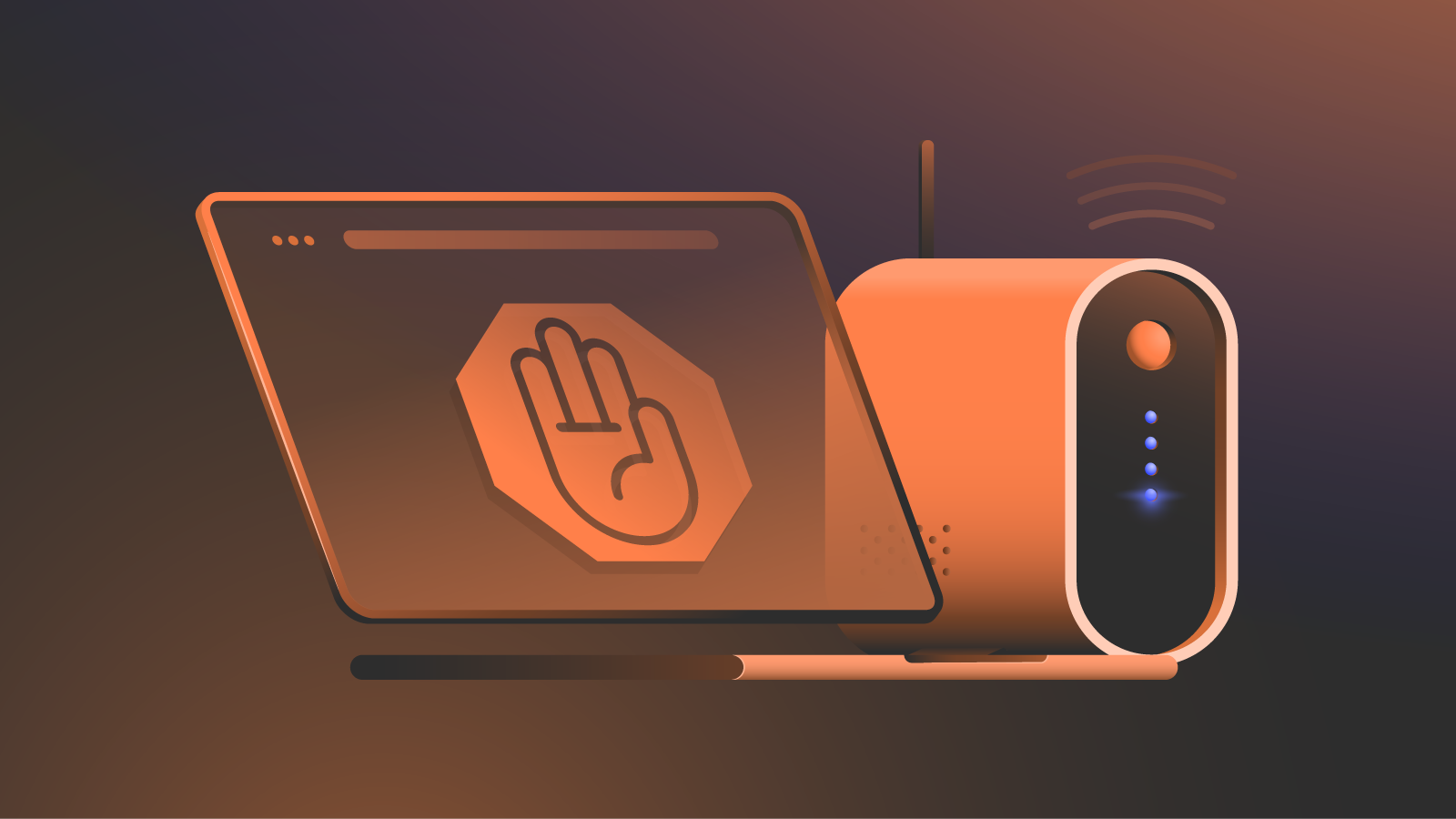
ISP blocking happens when your Internet Service Provider prevents you from accessing certain websites or streaming services. It’s like a digital librarian who won’t let you check out specific books — and who controls access to every site you want to visit. In many regions, you can bypass an ISP block with a VPN (Virtual Private Network) that hides your traffic, switch to public DNS servers, or enable encrypted browsing in your settings.
Let’s say you’re flying from London to Sydney. The in-flight Wi-Fi connects, but when you try to watch Match of the Day 2 on the BBC iPlayer — blocked. The airline’s provider restricts streaming to save bandwidth, joining thousands of networks that limit what passengers can watch. Twenty-three hours trapped on a plane, and you can’t access your favorite shows.
But digital walls have doors, and you hold the keys. To understand how to open them, let’s clarify who’s doing the blocking.
What does ISP stand for?
ISP stands for Internet Service Provider — the company that connects you to the internet. Every email you send, video you stream, or article you read travels through your ISP’s network as data packets. Your ISP essentially controls the bridge between your device and the entire internet.
From BT in the UK to Telstra in Australia, ISPs own the cables, routers, and servers that make internet access possible. They assign your unique IP address and, increasingly, filter which websites you can reach.
What is ISP blocking and how does it work?
ISP blocking happens when companies prevent access to online content. Think of your ISP as a postal service that refuses to deliver mail from certain addresses — except this happens instantly with every website request.
ISPs employ four main blocking strategies: corrupting DNS responses, analyzing your traffic contents, banning server addresses, and restricting data channels.
What is DNS?
DNS (Domain Name System) is the internet’s address book. Normally, when you type “bbc.com,” your ISP’s DNS translates this into numbers computers understand. With blocking, they deliberately give wrong directions or claim the destination doesn’t exist.
Your browser asks for Netflix’s address, but the ISP’s DNS says “never heard of it” — even though millions use it daily.
What is Deep Packet Inspection?
DPI (Deep Packet Inspection) allows ISPs to examine the actual contents of your internet traffic. Instead of just seeing that you’re sending a package, they open it up and read what’s inside. This includes identifying streaming video, social media posts, or news articles.
They filter based on content type, keywords, or data patterns — like reading your mail before delivery.
How IP blocking works
IP blocking bans entire neighborhoods of the internet. If Hulu operates from IP addresses 198.51.100.1 through 198.51.100.255, blocking this range cuts off Hulu completely. Unfortunately, this sledgehammer approach often blocks innocent sites sharing the same server space.
Understanding port blocking
Port blocking shuts specific channels that applications need. While web browsing uses port 443, streaming might need port 1935. Close these ports, and video services can’t deliver content even if the website loads.
Streaming platforms require multiple ports open for their content delivery networks to function (Netflix Help Center, 2024).
Blocking methods summarized:
📖 DNS tampering = Giving false directions to websites
🔍 Content inspection = Reading your data to spot forbidden content
🚫 Address blocking = Banning entire server locations
📺 Port closure = Shutting channels streaming needs
How to check if ISP is blocking a website
When BBC iPlayer won’t load or time out, determining the culprit — your device, the service, or ISP interference — requires systematic testing.
Diagnostic approach:
🟢 Basic: Compare networks
🟡 Detailed: Technical analysis
🔴 Conclusive: VPN testing
Network comparison test
Disconnect from Wi-Fi and use your phone’s mobile data. If blocked sites suddenly work, your regular ISP is likely filtering them. This works because mobile carriers rarely coordinate blocking with broadband providers.
Technical diagnostics
What each command checks:
- nslookup / dig – Does DNS resolve the name to an IP? You’ll have a DNS problem if this fails or returns a wrong IP.
- ping – Can your device reach the host at all? Shows packet loss and latency. Some sites block ping, so failure isn’t always fatal.
- tracert / traceroute – The path your traffic takes across the internet. Useful to spot where it stops or slows.
Run a few terminal programs below to see what’s blocking you and why:
Windows diagnostics:
nslookup bbc.com
ping bbc.com
tracert bbc.com
Mac/Linux equivalents:
dig bbc.com
ping bbc.com
traceroute bbc.com
DNS failures indicate lookup blocking. Successful pings but no browser access suggests content filtering. Traces dying at your ISP confirm deliberate blocking.
VPN verification
Connect through any VPN service and retry. Sites working through VPN but not regular connection proves ISP interference.
How to remove ISP website blocking
Breaking through requires understanding which tool defeats which block. But check local laws and service terms before using these tools so you’re accessing content you’re entitled to view.
Stop ISP blocking using VPN
VPNs wrap your traffic in encryption, creating a secure tunnel your ISP cannot inspect. They see encrypted data flowing to a VPN server but remain blind to your actual destinations.
Think of it as mailing a letter inside another envelope — your ISP only sees the outer address.
VPN setup process:
- Choose a streaming-capable service (FastVPN maintains servers optimized for video)
- Download their app to your device
- Log into your account
- Pick a server location
- Enable security features
- Connect before browsing
Your traffic automatically encrypts, hiding your activity from ISP monitoring.
Device-specific setup:
- Windows/Mac: Download desktop app
- Android/iOS: Install from app store
- Smart TVs: Configure router-level VPN
Bypass ISP block without a virtual private network
When VPNs won’t work — some services detect them, others cause buffering — alternative methods target specific blocking types.
Solution categories:
🟢 Quick fixes anyone can do
🟡 Moderate technical solutions
🔴 Complex workarounds
We recommend you try the green fixes first. If they don’t solve your problem, move to yellow options, and use red only if you’re allowed by your local laws and the ISP’s terms and conditions.
Note: Some countries restrict or prohibit VPN use. Check your local laws before using a VPN.
🟢 Changing your DNS provider
Replace your ISP’s censored DNS with open alternatives. Takes under a minute. Cloudflare’s 1.1.1.1 DNS processes 1.9 trillion queries daily from 250 countries (Cloudflare Radar, 2025).
Quick setup:
- Windows: Network settings > Change adapter > DNS > Use 1.1.1.1
- Mac: System Preferences > Network > Advanced > DNS > Add 1.1.1.1
- Android phone: Private DNS > Enter “one.one.one.one”
- iOS: enable DoH in supported browsers or use a DNS app
🟢 Using a smart DNS service
Smart DNS only reroutes blocked content while maintaining direct connections for everything else. Perfect for region-locked streaming with minimal speed loss in many cases.
🔴 Using a proxy server
Proxies request content on your behalf, like having someone else buy tickets when you’re banned from the venue. Complex setup but works for specific applications.
Configuration requires:
- Proxy address and port
- Authentication credentials
- Application-specific settings
Warning: May violate service terms.
🟢 DNS-over-HTTPS (DoH) implementation
DoH hides DNS queries inside regular web traffic, making them indistinguishable from normal browsing.
Browser activation:
- Chrome: Settings > Privacy > Secure DNS
- Firefox: Settings > Network > DNS over HTTPS
- Edge: Settings > Privacy > Security
Solution effectiveness:
🟢 DNS switch: Instant fix for basic blocks
🟢 DoH: Future-proof, built into browsers
🟡 Smart DNS: Best for streaming geo-blocks
🟡 VPN: Complete protection, small speed cost
🔴 Proxy: Last resort for specific apps
Getting your internet access back
Remember being unable to watch BBC iPlayer despite having active Wi-Fi? Your ISP might own the pipes, but they don’t own the internet itself.
The solutions we’ve covered aren’t just technical tricks — they’re your internet rights in action. A 30-second DNS change can unblock news sites at your Sydney hotel. A VPN turns your in-flight Wi-Fi into an open gateway, while Smart DNS brings your streaming library to life from anywhere.
The internet was built to be open — borders and blocks came later. These tools just restore what should have been yours all along. The Manchester derby you couldn’t watch on your flight? It’s waiting for you, just one DNS change or VPN connection away.
Stay legal, respect the rules where you are, but don’t let arbitrary blocks keep you from the content you’re entitled to access. An open internet is still available — you just need to know which doors to use.
Disclaimer: For educational purposes. Follow local laws and service agreements. Some methods may violate terms of service.
FAQ
Why is my ISP blocking a website?
ISPs block sites for government compliance, copyright protection, bandwidth conservation, or content policies. Many countries mandate blocking of political content, streaming services, or social platforms. Corporate and public Wi-Fi often restricts bandwidth-heavy sites.
How to check if ISP is blocking a website?
Test using mobile data versus regular connection. Try accessing via VPN. Use ping and traceroute commands to identify where connections fail. If sites work on alternative networks but not your ISP, blocking is confirmed.
Can an ISP block VPN?
Yes, through protocol detection, server IP blacklists, or port restrictions. However, modern VPNs use obfuscation making traffic appear as regular HTTPS, defeating most detection methods.
Does a VPN protect you from your ISP?
VPNs encrypt all traffic, preventing ISPs from monitoring visited sites, downloads, or activities. ISPs see VPN usage but cannot access content within the encrypted tunnel.
What are ISP services?
ISPs provide internet connectivity, IP addresses, DNS resolution, email, and network security. Many bundle television, phone service, cloud storage, and technical support while maintaining the physical infrastructure connecting users to the internet.







